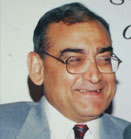Justice Markandeya Katju
 Justice Markandeya Katju
Justice Markandeya Katju
Hon’ble Justice Markandeya Katju was born on 20-9-1946. He obtained first division in every examination he appeared for, from Senior Cambridge to LL.B. He stood first in the merit list in LL.B from Allahabad University in 1967. Thereafter, he practiced law in the Allahabad High Court specializing in Labour Law, Taxation and Writ Petitions. He has worked as Standing Counsel, Income Tax Department. He has also served as a Member, International Association of Refugee Law Judges (IARIJ) and attended conference in Switzerland from 23rd to 28th October 2000 and various law related conferences in Delhi and elsewhere. He was elevated to the Bench in 1991, and since then has given several landmark judgments.
Hon’ble Justice Markandeya Katju is keenly interested in academics, and has a wide range of interests, including Sanskrit, Urdu, History, Philosophy, Science, Sociology etc. apart from his interest in jurisprudence. He has written several books, such as ‘Law in the Scientific Era’, ‘Interpretation of Taxing Statutes’ and ‘Domestic Enquiry’. His study of diverse subjects is reflected in his judgments, which are often unconventional and path breaking.
Hon’ble Justice Markandeya Katju is the son of late Justice S.N.Katju, who was a former Judge of Allahabad High Court, and the grand son of late Dr K.N.Katju, former Union Home and Defence Minister, Governor of West Bengal and Orissa and Chief Minister of Madhya Pradesh.
Hon’ble Justice Markandeya Katju has got passionate love for Indian culture and his keen desire to unearth and bring to light the great intellectual achievements of our ancestors was the main motivating force in bringing the book “Mimansa Rules of Interpretation”. Hon’ble Justice Markandeya Katju has pointed out in his lecture and articles (which have been published in Part I of the Mimansa Rules of Interpretation) that Mimansa Rules of Interpretation were one of the greatest and most remarkable achievements of our ancestors, but about which even the educated Indian are wholly ignorant today.
Appointed as Chief Justice of Madras High Court on 28th November 2004. In the Madras High Court, the recent judgment delivered on the constitutional question of inter se relationship between the Judiciary and the Executive, and the doctrine of judicial restraint is widely appreciated by everyone.
Appointed as Chief Justice of High Court of Delhi on 12th October 2005. Elevated to Supreme Court on 10 th April, 2006.















